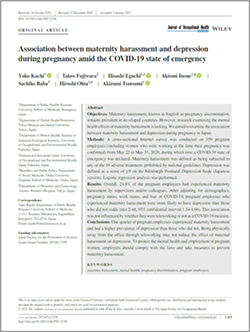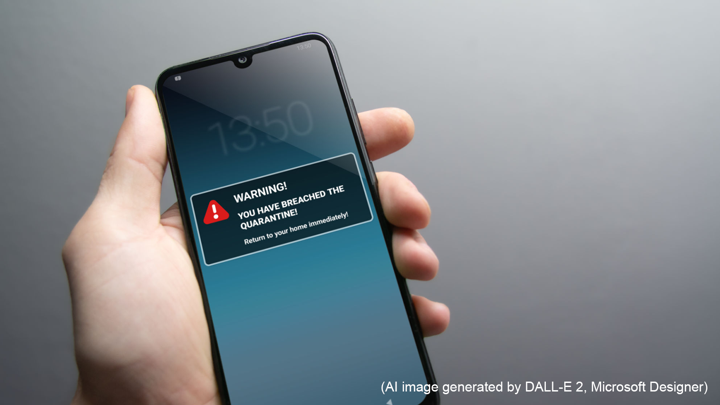#0111 Association between maternity harassment and depression during pregnancy amid the COVID-19 state of emergency

Women who Experience Maternity Harassment Are at an Elevated Risk of Depression
In Japanese law, the term maternity harassment, which is often referred to as pregnancy discrimination in English-language sources, describes the phenomenon of women experiencing adverse treatment or harassment in the workplace because of their pregnancy, childbirth, or for requesting or taking leave for pregnancy or childbirth and for child or family care. Past studies have shown that maternity harassment can negatively affect a woman’s health, income, and career, with some women even leaving their employers due to maternity harassment. However, the existing scientific literature offers relatively little information about the mental health effects of maternity harassment.
We therefore decided to investigate the relationship between maternity harassment and depression in Japanese women. For our study, which we describe in an article recently published in the Journal of Occupational Health, we conducted an online survey of 359 pregnant women who participated in the Japanese workforce. We collected survey responses between May 22 and May 31 of 2020, a time period that coincided with Japan’s declared state of emergency due to the COVID-19 pandemic. We defined maternity harassment as the state of being subjected to any of 16 forms of adverse treatments prohibited by national guidelines. Depression was defined as a score of 9 or more on the Japanese version of the self-rated Edinburgh Postnatal Depression Scale.
Overall, 24.8% of the survey respondents reported having experienced maternity harassment at the hands of their supervisors, colleagues, or both. Furthermore, women who reported having experienced maternity harassment were almost 2.5 times more likely to have depression than their counterparts who had not experienced maternity harassment. Interestingly, this association between maternity harassment and depression did not differ for women who were teleworking due to the COVID-19 state of emergency. Of further concern was the finding that about half the total respondents were unaware if measures were in place to prevent maternity harassment at work according to national acts, while more than 20% reported the absence of these measures entirely.
In conclusion, our findings provide clear evidence for an association between maternity harassment and depression in Japanese women. Furthermore, being physically out of the office as a teleworker does not lessen the negative impacts of maternity harassment. Given the strong evidence for the adverse effects of maternity harassment, it is in the interest of employers to comply with laws against maternity harassment and take measures to prevent it.

Link to the original journal article:
https://onlinelibrary.wiley.com/doi/10.1002/1348-9585.12196
Title of the paper:
Association between maternity harassment and depression during pregnancy amid the COVID-19 state of emergency
Authors:
Yuko Kachi, Takeo Fujiwara, Hisashi Eguchi, Akiomi Inoue, Sachiko Baba, Hiroshi Ohta, and Akizumi Tsutsumi




